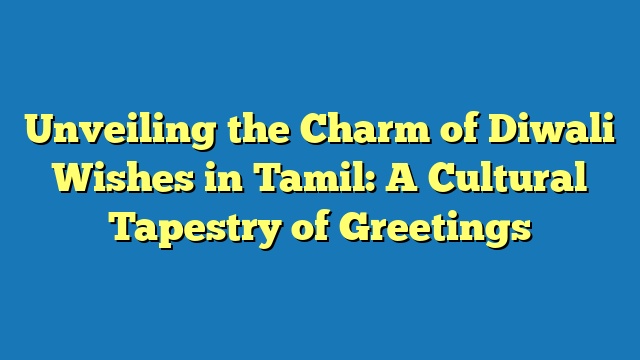“Happy Diwali Wishes Quotes Messages in Tamil” are heartfelt expressions that convey warm greetings and good wishes during the festival of Diwali. They often include traditional Tamil phrases, religious references, and poetic language.
These messages play a vital role in fostering social connections, spreading joy, and celebrating the cultural significance of Diwali. They provide a means to honor deities, seek blessings, and share happiness with loved ones. One significant development was the introduction of digital platforms, which has made it easier to share these messages with a wider audience.
This article delves into the nuances and traditions associated with “Happy Diwali Wishes Quotes Messages in Tamil,” examining their cultural importance, historical roots, and contemporary usage.
Happy Diwali Wishes Quotes Messages in Tamil
The key aspects of “Happy Diwali Wishes Quotes Messages in Tamil” are crucial to understanding the cultural and linguistic significance of these expressions during the festival of Diwali. These aspects encompass various dimensions, including:
- Traditional Phrases:Convey cultural heritage and religious sentiments.
- Poetic Language:Adds grace and beauty to the messages.
- Religious Symbolism:Reflects the spiritual essence of Diwali.
- Social Bonding:Fosters connections and strengthens relationships.
- Cultural Significance:Preserves and promotes Tamil culture.
- Digitalization:Expands the reach and accessibility of messages.
- Historical Roots:Connects to centuries-old traditions.
- Contemporary Usage:Adaptations to modern communication channels.
These aspects collectively contribute to the unique charm and significance of “Happy Diwali Wishes Quotes Messages in Tamil.” They allow individuals to express their joy, gratitude, and well wishes during the festival, while also honoring the cultural and religious traditions associated with Diwali.
Traditional Phrases
Within the realm of “Happy Diwali Wishes Quotes Messages in Tamil,” traditional phrases hold immense significance in conveying cultural heritage and religious sentiments. These phrases, steeped in Tamil culture and tradition, serve as a means to express deep-rooted emotions and beliefs during the festival of Diwali.
- Invocation of Deities: Diwali messages often begin with an invocation of deities such as Lakshmi, Ganesha, or Saraswati. This practice acknowledges the divine presence and seeks blessings for prosperity, wisdom, and success.
- Cultural Symbols: Traditional phrases frequently incorporate cultural symbols associated with Diwali, such as diyas (oil lamps), kolam (floor designs), and fireworks. These references evoke the festive spirit and add a touch of authenticity to the messages.
- Religious Beliefs: Many messages convey religious beliefs and values associated with Diwali. For instance, they may reference the triumph of good over evil or the importance of light dispelling darkness.
- Historical References: Traditional phrases sometimes draw upon historical events or mythological tales related to Diwali. These references connect the present-day celebrations to the rich cultural tapestry of the past.
In essence, the use of traditional phrases in “Happy Diwali Wishes Quotes Messages in Tamil” not only conveys well wishes but also reinforces cultural identity, preserves religious traditions, and strengthens the bonds of community during the festive season.
Poetic Language
Within the context of “Happy Diwali Wishes Quotes Messages in Tamil,” poetic language plays a pivotal role in enhancing the grace and beauty of these messages. It transforms ordinary words into an artistic expression, evoking emotions and creating a lasting impact on the recipient.
One of the key reasons why poetic language is so effective in Diwali messages is its ability to convey complex emotions and sentiments in a concise and elegant manner. Through the use of metaphors, similes, and other literary devices, poetic language adds depth and nuance to the messages, making them more meaningful and memorable.
Furthermore, poetic language adds an aesthetic dimension to the messages, making them a joy to read and share. The use of rhythm, rhyme, and alliteration creates a musicality that appeals to the senses and enhances the overall experience of receiving a Diwali wish.
In practical terms, the use of poetic language in “Happy Diwali Wishes Quotes Messages in Tamil” serves several purposes. It elevates the messages beyond mere well wishes, transforming them into works of art that can be cherished and shared for years to come. Additionally, poetic language helps to preserve and promote the Tamil language, showcasing its richness and beauty to a wider audience.
In essence, the connection between poetic language and “Happy Diwali Wishes Quotes Messages in Tamil” is a symbiotic one. Poetic language enhances the grace and beauty of the messages, making them more meaningful, memorable, and aesthetically pleasing. In turn, these messages serve as a vehicle for the preservation and promotion of poetic language, ensuring its continued use and appreciation in Tamil culture.
Religious Symbolism
Within the realm of “happy diwali wishes quotes messages in tamil,” religious symbolism plays a central role in reflecting the spiritual essence of Diwali. These messages often incorporate symbols and references that embody the religious beliefs and practices associated with the festival.
- Deities and Divine Figures: Diwali messages frequently mention deities such as Lakshmi, Ganesha, and Saraswati. These references invoke the divine presence and seek blessings for prosperity, wisdom, and success.
- Sacred Objects and Symbols: Diyas (oil lamps), kolam (floor designs), and fireworks hold significant religious symbolism in Diwali. These elements represent the triumph of good over evil, the dispelling of darkness, and the celebration of life.
- Religious Rituals and Practices: Diwali messages may also refer to specific religious rituals and practices, such as Lakshmi Puja or the lighting of diyas. These references reinforce the spiritual significance of the festival and foster a sense of community.
- Mythological Tales and Legends: Many Diwali messages draw inspiration from mythological tales and legends associated with the festival. These stories often convey moral lessons and reinforce the spiritual values of Diwali.
In essence, the use of religious symbolism in “happy diwali wishes quotes messages in tamil” serves to deepen the spiritual connection of the festival. These messages not only convey well wishes but also reinforce religious beliefs, foster a sense of community, and promote the preservation of cultural traditions.
Social Bonding
Within the context of “happy diwali wishes quotes messages in tamil,” social bonding plays a pivotal role in fostering connections and strengthening relationships. Diwali is a festival that celebrates the triumph of good over evil and the renewal of life. It is a time for families and friends to come together, share in the festivities, and express their love and gratitude for one another.
The exchange of Diwali wishes and messages is an important aspect of social bonding during this festival. These messages serve as a way to convey well wishes, blessings, and prayers for happiness and prosperity. They also provide an opportunity for individuals to reconnect with loved ones, strengthen existing relationships, and build new ones.
Furthermore, the act of sharing Diwali wishes and messages contributes to a sense of community and belonging. It reinforces the shared cultural values and traditions that unite people during this festive occasion. By participating in this exchange, individuals not only express their own well wishes but also contribute to the collective joy and spirit of Diwali.
In essence, the connection between “happy diwali wishes quotes messages in tamil” and social bonding is a two-way street. Diwali wishes and messages facilitate social bonding by providing a means for individuals to connect with loved ones, express their well wishes, and participate in a shared cultural experience. Conversely, social bonding strengthens the significance and impact of Diwali wishes and messages, making them a cherished part of the festival’s traditions.
Cultural Significance
The connection between “Cultural Significance:Preserves and promotes Tamil culture.” and “happy diwali wishes quotes messages in tamil” is deeply intertwined. Diwali, being a significant cultural and religious festival in Tamil Nadu, serves as a catalyst for preserving and promoting the Tamil language and its traditions.
“Happy diwali wishes quotes messages in tamil” play a crucial role in upholding the cultural heritage of Tamil Nadu. These messages often incorporate traditional Tamil phrases, poetic language, and religious symbolism, thereby showcasing the richness and diversity of the Tamil language. By using Tamil as the medium of expression, these messages contribute to the preservation and promotion of the language, ensuring its continued use and appreciation in the years to come.
Furthermore, the exchange of Diwali wishes and messages during this festive occasion fosters a sense of community and belonging among Tamil people. It reinforces their shared cultural identity and strengthens the bonds that unite them. By actively participating in this cultural practice, individuals not only convey their well wishes but also contribute to the collective celebration and preservation of Tamil culture.
In essence, “happy diwali wishes quotes messages in tamil” serve as a vehicle for preserving and promoting Tamil culture. These messages not only convey well wishes but also embody the spirit of Diwali and contribute to the continuity of Tamil traditions. Their significance lies in their ability to connect people, reinforce cultural values, and ensure the vitality of the Tamil language.
Digitalization
In the context of “happy diwali wishes quotes messages in tamil,” digitalization plays a pivotal role in expanding the reach and accessibility of these messages, enabling them to transcend geographical boundaries and cultural barriers.
- Social Media Platforms: Social media platforms such as Facebook, Instagram, and WhatsApp have become popular channels for sharing Diwali wishes and messages. These platforms allow users to connect with friends and family members who may be, making it easier to convey well wishes and spread festive cheer.
- Messaging Applications: Messaging applications like WhatsApp, Telegram, and Signal have further enhanced the accessibility of Diwali wishes and messages. These apps allow users to send instant messages, images, and videos, making it convenient to share Diwali greetings with multiple contacts simultaneously.
- E-Cards and Online Greetings: Digitalization has led to the proliferation of e-cards and online greeting services that offer a wide range of Diwali-themed templates and designs. These e-cards can be easily customized and shared via email or social media, providing a visually appealing and personalized way to convey Diwali wishes.
- Digital Archiving and Preservation: Digitalization also contributes to the archiving and preservation of Diwali wishes and messages. Online platforms and social media archives allow users to store and access their Diwali messages for future reference, ensuring that these precious memories are not lost over time.
In conclusion, digitalization has revolutionized the way in which “happy diwali wishes quotes messages in tamil” are shared and experienced. Through social media platforms, messaging applications, e-cards, and online archiving, digitalization has expanded the reach of Diwali wishes, made them more accessible to a wider audience, and contributed to their preservation for future generations.
Historical Roots
Within the realm of “happy diwali wishes quotes messages in tamil,” historical roots play a vital role in connecting these messages to centuries-old traditions and cultural practices. This historical connection enriches the significance and meaning behind these messages, providing a deeper understanding of their origins and evolution.
- Ancient Origins: Diwali wishes and messages can be traced back to ancient Tamil literature and inscriptions, showcasing their deep-rooted connection to the cultural heritage of Tamil Nadu. These ancient texts provide insights into the origins and evolution of Diwali traditions, including the exchange of greetings and well wishes.
- Religious Significance: Diwali holds immense religious significance in Hinduism, and many Diwali wishes and messages are infused with religious symbolism and references. These messages often invoke deities such as Lakshmi, Ganesha, and Saraswati, seeking their blessings for prosperity, wisdom, and success.
- Literary Traditions: Diwali wishes and messages have been an integral part of Tamil literary traditions for centuries. Poets and writers have crafted beautiful and evocative verses to express their Diwali greetings, contributing to the rich tapestry of Tamil literature.
- Cultural Exchange: Over the centuries, Diwali wishes and messages have been influenced by cultural exchanges with other regions of India and beyond. This cross-cultural pollination has enriched the diversity and variety of Diwali greetings, reflecting the syncretic nature of Tamil culture.
In conclusion, the historical roots of “happy diwali wishes quotes messages in tamil” provide a bridge to centuries-old traditions, religious beliefs, literary heritage, and cultural exchange. Understanding these historical connections deepens our appreciation for the significance and beauty of these messages, which continue to play a vital role in celebrating the festival of Diwali in Tamil Nadu.
Contemporary Usage
The advent of modern communication channels has significantly influenced the contemporary usage of “happy diwali wishes quotes messages in tamil.” These channels have transformed the way people share Diwali greetings, enabling them to connect with friends and family across geographical distances and cultural barriers.
One of the key effects of modern communication channels is the increased convenience and accessibility of Diwali wishes. In the past, people relied on traditional methods such as postal mail or phone calls to send Diwali messages. However, with the advent of social media, messaging apps, and email, it has become much easier to send Diwali greetings to multiple recipients simultaneously. This has made it possible for people to stay connected with loved ones during the festive season, regardless of their location.
Furthermore, modern communication channels have allowed for greater creativity and personalization in Diwali wishes. Social media platforms, in particular, provide users with a variety of tools and features to create visually appealing and engaging Diwali messages. People can share photos, videos, and GIFs to express their Diwali greetings in a unique and memorable way. This has led to a proliferation of creative and innovative Diwali wishes, reflecting the vibrant and diverse nature of Tamil culture.
In conclusion, the contemporary usage of “happy diwali wishes quotes messages in tamil” is closely intertwined with the adaptations to modern communication channels. These channels have not only made it easier and more convenient to share Diwali greetings but have also enabled greater creativity and personalization. As technology continues to evolve, it is likely that the use of modern communication channels for Diwali wishes will continue to grow and adapt, further enriching the cultural significance of this festive tradition.
Frequently Asked Questions about “Happy Diwali Wishes Quotes Messages in Tamil”
This section addresses common queries and misconceptions related to “Happy Diwali Wishes Quotes Messages in Tamil,” providing clear and concise answers to enhance understanding and appreciation of this cultural tradition.
Question 1: What is the significance of traditional phrases in Diwali messages?
Answer: Traditional phrases in Diwali messages convey cultural heritage, religious sentiments, and invoke deities, adding depth and authenticity to the well wishes.
Question 2: How does poetic language elevate Diwali messages?
Answer: Poetic language enhances the grace and beauty of Diwali messages, making them more meaningful, memorable, and aesthetically pleasing through the use of metaphors and literary devices.
Question 3: What is the role of religious symbolism in Diwali wishes?
Answer: Religious symbolism in Diwali messages reflects the spiritual essence of the festival, incorporating deities, sacred objects, and mythological references to reinforce religious beliefs and foster a sense of community.
Question 4: How do Diwali wishes contribute to social bonding?
Answer: The exchange of Diwali wishes strengthens relationships, fosters connections, and promotes a sense of belonging by providing a means to express love, gratitude, and well wishes.
Question 5: What is the cultural significance of Diwali wishes in Tamil?
Answer: Diwali wishes in Tamil preserve and promote Tamil culture by incorporating traditional phrases, poetic language, and religious symbolism, reinforcing cultural identity and shared values.
Question 6: How has digitalization impacted the sharing of Diwali wishes?
Answer: Digitalization has expanded the reach and accessibility of Diwali wishes through social media, messaging apps, and online platforms, enabling convenient and personalized sharing of greetings across geographical boundaries.
In summary, these FAQs provide insights into the cultural significance, linguistic nuances, and contemporary usage of “Happy Diwali Wishes Quotes Messages in Tamil,” enhancing our understanding and appreciation of this vibrant tradition.
Moving forward, the next section of this article will delve into the historical roots of Diwali wishes in Tamil literature, exploring their evolution and the influence of religious beliefs on their content and form.
Tips for Crafting Meaningful “Happy Diwali Wishes Quotes Messages in Tamil”
Creating heartfelt and authentic Diwali wishes in Tamil requires careful consideration of cultural nuances, traditional phrases, and religious sentiments. Here are eight tips to guide you in crafting meaningful and memorable messages:
Tip 1: Embrace Traditional Phrases: Incorporate traditional Tamil phrases that convey cultural heritage and religious beliefs, such as “Iniya Deepavali Nalvazhthukkal” (Happy Diwali Wishes).
Tip 2: Use Poetic Language: Enhance the beauty and grace of your messages with poetic devices like metaphors, similes, and rhythmic patterns.
Tip 3: Invoke Religious Symbolism: Reference deities like Lakshmi, Ganesha, and Saraswati, and incorporate sacred symbols like diyas and kolam to reflect the spiritual essence of Diwali.
Tip 4: Express Gratitude and Well Wishes: Convey your heartfelt gratitude and well wishes for prosperity, happiness, and success.
Tip 5: Personalize Your Messages: Tailor your messages to the recipient, expressing your unique bond and shared experiences.
Tip 6: Use Social Media: Leverage social media platforms like Facebook and Twitter to share your Diwali wishes with a wider audience.
Tip 7: Explore Online Resources: Utilize online resources and websites that offer a collection of Diwali wishes in Tamil for inspiration.
Tip 8: Embrace Digital Greetings: Send digital greetings and e-cards that combine traditional elements with modern convenience.
By following these tips, you can create “Happy Diwali Wishes Quotes Messages in Tamil” that are not only beautiful and meaningful but also reflective of the rich cultural heritage of Tamil Nadu.
As we explore the nuances of Diwali wishes in Tamil literature, these tips will serve as a foundation for understanding the historical evolution and cultural significance of this vibrant tradition.
“Happy Diwali Wishes Quotes Messages in Tamil” explores the cultural and linguistic significance of Diwali greetings in Tamil Nadu. Traditional phrases, poetic language, and religious symbolism are interwoven to convey well wishes, strengthen social bonds, and preserve cultural heritage. Digitalization has expanded the reach of these messages, making them a ubiquitous part of Diwali celebrations.
Key takeaways include the importance of preserving traditional elements in modern communication, the role of Diwali wishes in fostering community, and the adaptability of cultural traditions to evolving technologies. Understanding these nuances enriches our appreciation for the vibrant cultural tapestry of Tamil Nadu and the enduring significance of Diwali wishes.









Tips for Using "Template by Kevin Crafts" Comments for Meaningful Online Discussions